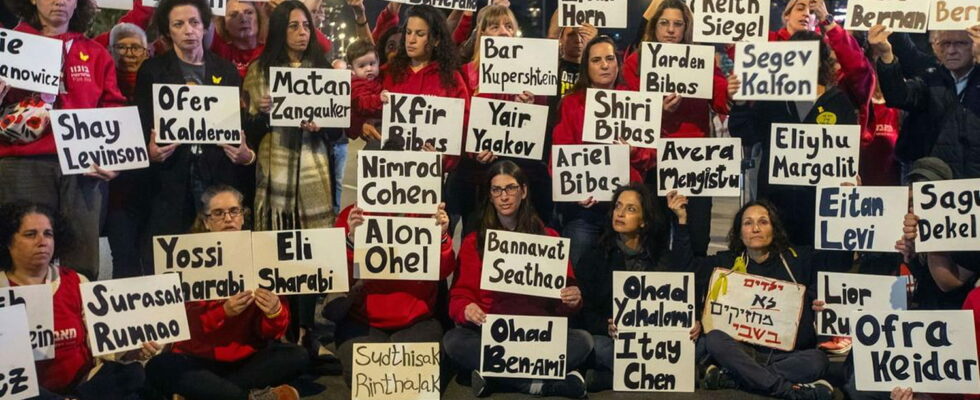The four Israeli released on Saturday January 25 are “stable” after more than 400 days of captivity. They were released within the framework of the ceasefire agreement between Israel and Hamas, but the Hebrew state accuses the other part of violations of the agreement.
Four Israeli soldiers were released on Saturday January 25 by Hamas, and joined the Hebrew state in the morning. They are Karina Arif, Daniela Gilboa, Naama Levy and Liri Albag. In Gaza, they appeared in good shape before their return to the Red Cross, then to the army of Israel. When they arrived, they were welcomed by their families and a crowd acclaiming them. The ex-hostages were quickly transferred to a hospital, which took care of them for medical examinations. He said during the day that they were in a “stable state”.
The old hostages were exchanged for 200 Palestinian prisoners, released by Israel at the end of the morning. Among them, there are 121 prisoners sentenced to life and 79 prisoners serving long sentences. Most of them were transferred by bus to Ramallah, in the West Bank, where they were greeted by a joy in joy. Sixteen other were brought to the Gaza Strip, and 70 were expelled to Egypt. After having passed through this country, these former prisoners “will choose Algeria, Turkey or Tunisia,” said Amin Choumane, head of the High Palestinian Committee for monitoring the affairs of prisoners and prisoners released, words cited by The world.
The agreement in danger?
But already, the cease-fire agreement, which has allowed the organization of such an exchange, could be in danger. Israel accuses Hamas of two violations of the agreement, according to a statement published on Sunday, January 26, from Prime Minister Benyamin Netanyahu: the Hebrew State was indeed claiming the Liberation on Saturday of Arbel Yehoud, a civilian, which did not happen , as well as a “list of status” of the hostages (to find out if they are alive or dead), which has not been subjected. As a result, Israel justifies the maintenance of his troops in the Netzarim corridor, when their withdrawal was to allow the return of the Gazaoui to the north of the enclave, as long as these conditions are not respected. In the wake of this threat, Hamas said that Arbbel Yehoud would be part of the next burst of liberations on Saturday, February 1, relates Release.
As a reminder, the truce between Israel and Hamas began on Sunday January 19, 2025 at 11:15 am (10:15 am French time), three hours late, Hamas recognizing a setback “for technical reasons on the field”. In the process, the first hostages were released. These are three women: Romi Gonen (24), Emily Damari (28) and Doron Steinbrecher (31 years old). A few hours later, Israel announced that it had released 90 Palestinian prisoners as part of the first exchange of prisoners provided by the truce agreement with Hamas. “Tonight, 90 terrorists were (…) released” from OFER military prison, in the occupied West Bank, and a detention center in Jerusalem, said a press release from the Israeli prison authority.
These prisoner exchanges must take place at more or less regular intervals for six weeks. In total, this concerns 33 Israeli hostages and 1,900 Palestinian prisoners. “Between three and four women abducted” will be “released every week,” said Daniel Hagari, the Israeli army spokesman last week, even if Benjamin Netanyahu warned that Israel reserved himself “the right to resume the war if necessary “. The Hebrew State has already published a list of 734 “liberable” detainees. Hamas and Israel would have finally agreed on the release of 296 Palestinian prisoners sentenced to life during the next phase, of which 236 must be deported, either to Qatar or in Turkey.
What this truce agreement contains
Washington, the main ally of Israel, like the other members of the G7, encourages the belligerents to go further and negotiate a lasting peace in a press release: “We are urging all parties to constructively negotiate the subsequent phases of the ‘Agreement, to guarantee its full implementation and the final end of hostilities “. But nothing guarantees the success of the next negotiations. Before confirming the agreement, Benyamin Netanyahu said on Thursday, January 16, that Hamas had “withdrawn from certain agreements” at the last minute: “Hamas returns to the agreements and creates a crisis that prevents an agreement”. He had warned that the Israeli government “will not meet as long as […] Hamas has accepted all the elements of the agreement “.
During his press conference, the Qatari Prime Minister revealed that the agreement concluded included three phases. The first will be to position the Israeli troops along the Gaza border, “which will allow an exchange of prisoners, to the displaced people to find their accommodation and will also facilitate the transfer of people injured to be able to follow treatments”, detailed Mohammed Ben Abderrahmane Al-Thani.
“A delivery of humanitarian aid everywhere in the Gaza Strip allowing the entry of basic necessities, especially for displaced people who have lost their accommodation following the war, as well as the rehabilitation of hospitals, health centers And others “are also on the program for this first phase. The phases two and three remain unclear at this stage. They “will be finalized when implementing the first phase,” said the Prime Minister.
